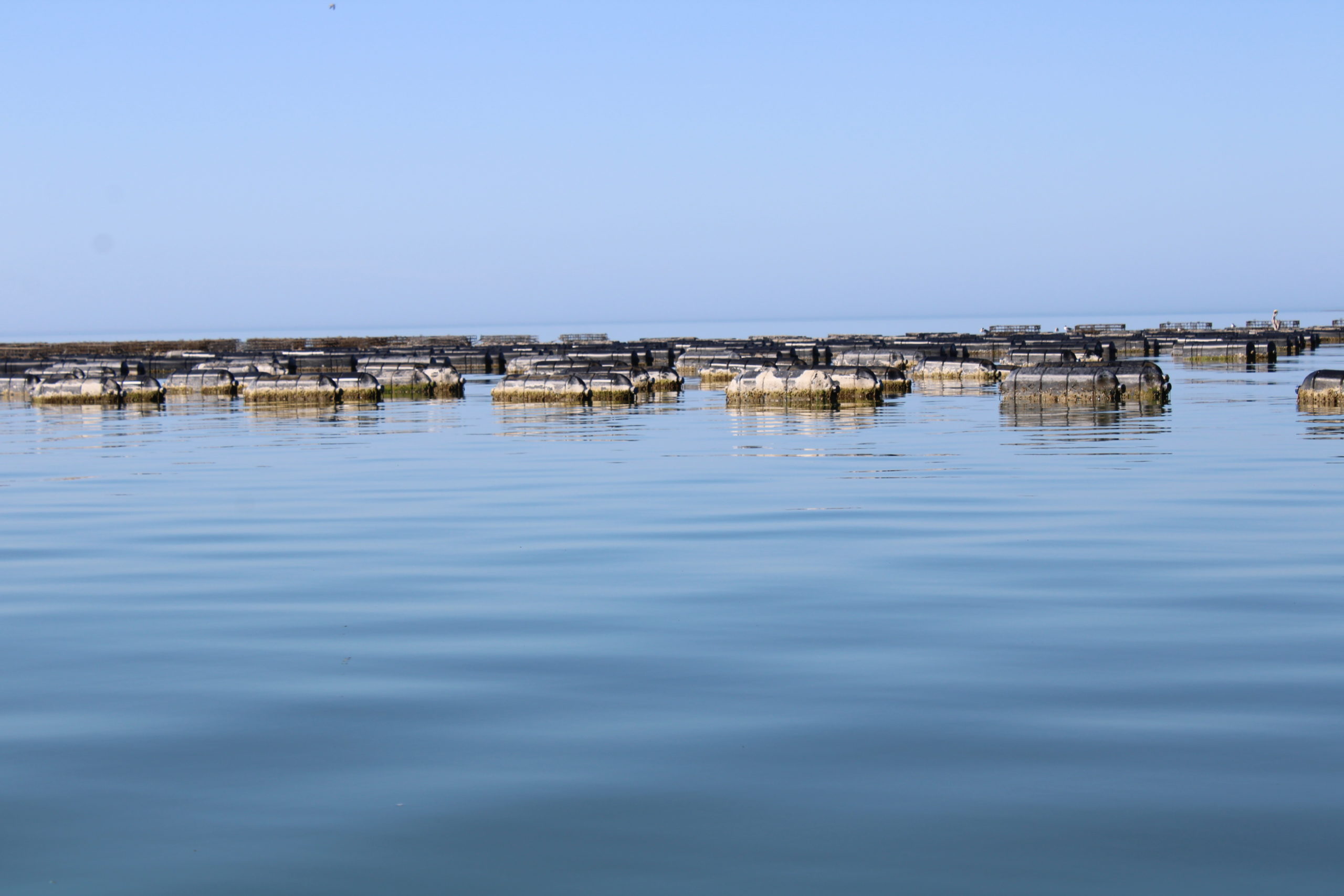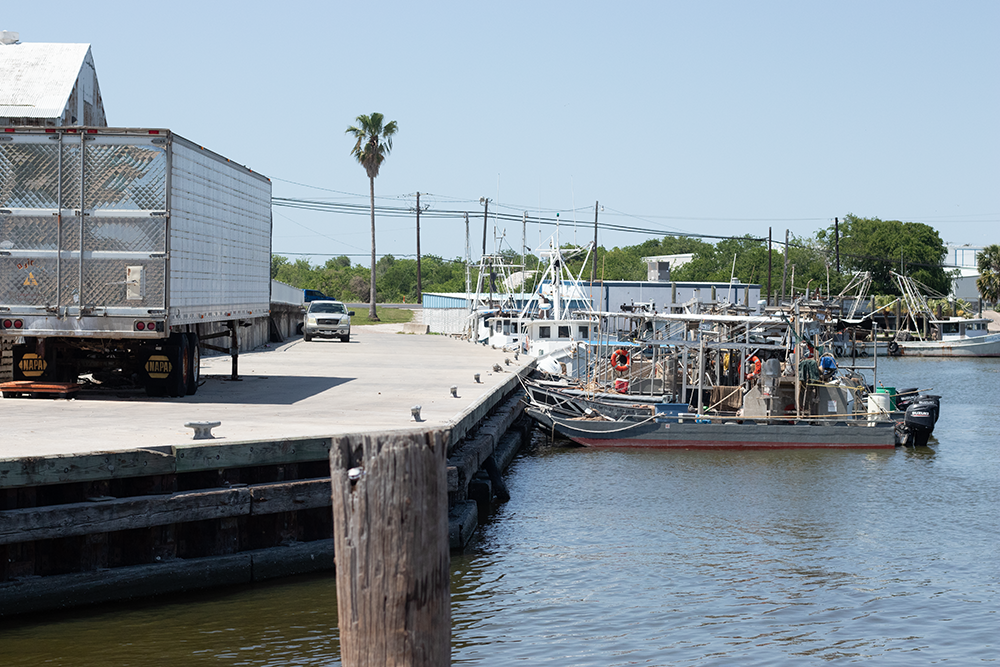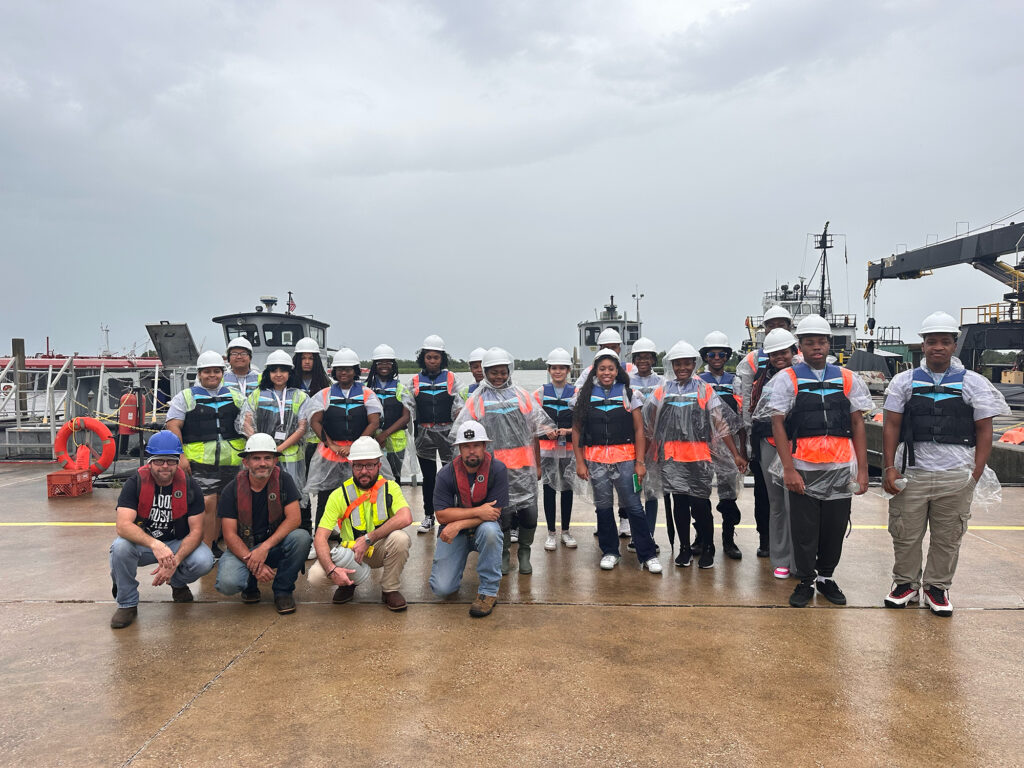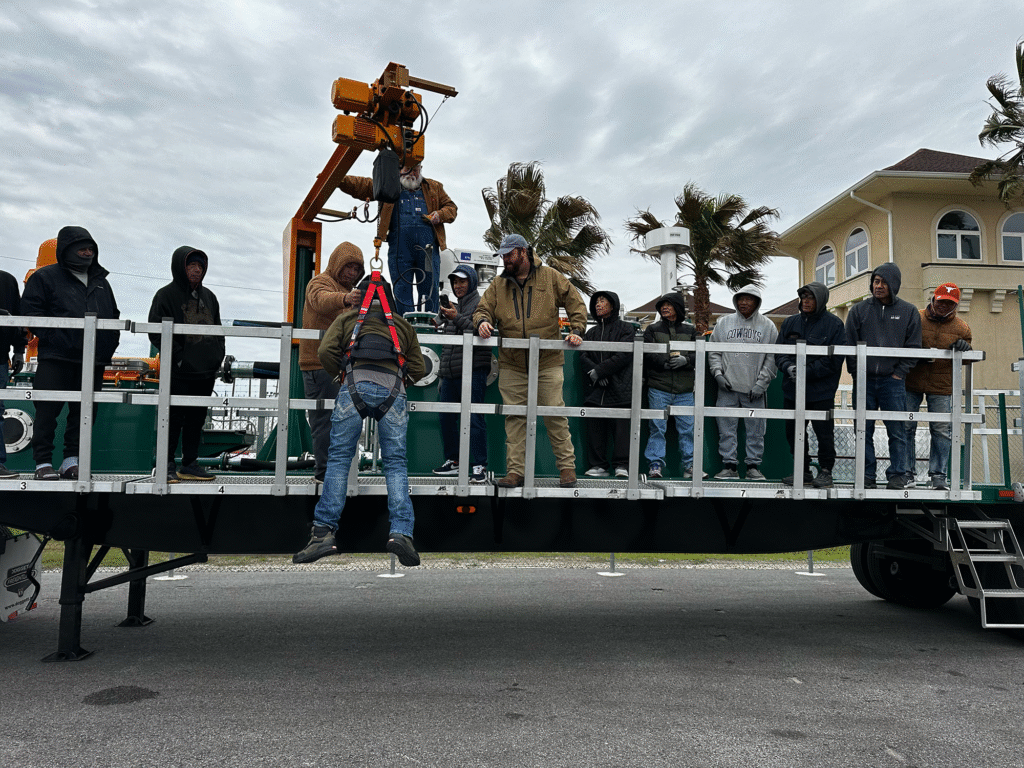- Aquaculture
- Commercial Fisheries
- Community Engagement
- Extension
- Research
- STEM Literacy and Workforce Development
- Sustainable Fisheries and Aquaculture
Texas Sea Grant Fuels Local Innovation in Seafood, Safety and Sustainability
From the Gulf Coast to inland communities, Texas Sea Grant is helping ensure that the benefits of a thriving marine economy reach more people, more places and more industries. We connect local businesses and communities with the science, partnerships and tools they need to grow, adapt and succeed.
 Oyster farm cages floating in Palacios, Texas.
Oyster farm cages floating in Palacios, Texas.As highlighted in Seafood Source, America’s maritime economy is surging thanks in large part to the national Sea Grant network. At Texas Sea Grant, based at Texas A&M University, we’re proud to be part of that momentum, supporting coastal industries, advancing sustainable seafood and investing in the next generation of maritime professionals.
From the Gulf Coast to inland communities, Texas Sea Grant is helping ensure that the benefits of a thriving marine economy reach more people, more places and more industries. We connect local businesses and communities with the science, partnerships and tools they need to grow, adapt and succeed.
Sustaining Local Seafood and Commercial Fishing
Texas has a rich seafood heritage, and Texas Sea Grant is helping ensure it has a strong future. We work alongside fishermen, seafood processors, researchers and retailers to keep local seafood competitive, sustainable and accessible.
Texas Sea Grant’s ‘Better Bycatch Reducation Devices for the Shrimp Trawl Fishery‘ project (Better BRD) is transforming how bycatch is addressed in Gulf shrimp fisheries. Bycatch reduction devices, or BRDs, are specialized gear modifications that allow non-target species, such as juvenile fish or sea turtles, to escape shrimp trawls. These devices are critical for protecting marine ecosystems, maintaining compliance with federal regulations and ensuring the long-term sustainability of the shrimping industry.
In partnership with NOAA Fisheries, the National Marine Fisheries Service and Louisiana Sea Grant, the Better BRD Project aims to improve gear efficiency, reduce bycatch, streamline usability and increase adoption among commercial shrimpers. What sets this effort apart is its boots-on-deck approach. Grounded in the principle of “science from the deck up,” it engages shrimpers directly in the research, testing and refinement process. Their knowledge and feedback ensure that innovations are both scientifically effective and practically viable.
Brownsville Zimco Shrimp Fleet Manager Leonard Leyva says, “Sea Grant is always there, ready to help us out. They involve us in stakeholder meetings and try to help us find better bycatch reduction devices that work for our needs. They test them for us, and really work with us to try to lessen bycatch.”
The result of projects like this one is a new generation of gear that reduce bycatch, support sustainable fisheries and help safeguard the future of Gulf Coast shrimping communities.
In addition to gear innovation, Texas Sea Grant is helping build stronger, more resilient seafood supply chains. Working with the Texas Department of Agriculture, the program is expanding access to fresh, locally harvested Gulf seafood through the “Go Texan, Shop Local” initiative. This statewide effort promotes Texas-made products, reduces reliance on imports and keeps money circulating in coastal communities.
By forging stronger connections between fishermen and inland markets, the initiative helps bring wild-caught Gulf shrimp, oysters, crab and fish to restaurants, grocery stores and home kitchens across the state. Through outreach materials, digital content and chef partnerships, the campaign highlights the flavor, freshness and sustainability of wild-caught Texas seafood and tells the stories of the hardworking Texans who harvest it.
Texas Sea Grant also played a key role in launching the Texas Gulf Seafood website and recipe book, which connect consumers to local providers, seafood guides and sustainability resources. These tools are helping reshape how Texans understand and access their coastal bounty. It’s not just about eating local, it’s about sustaining an entire way of life.
Supporting Coastal Jobs Through Support of the Aquaculture Industry
Furthermore, Texas Sea Grant is assisting in the expansion of Texas’ aquaculture industry. Texas is the second-largest commercial oyster producer in the country, but the industry has faced increasing strain from environmental challenges and overfishing. Through technical support, permitting, certification guidance and workforce development, Texas Sea Grant is supporting sustainable wild harvest and oyster farms that diversify the state’s seafood economy and revitalize working waterfronts.
Texas Sea Grant first supported Prestige Oyster’s Inc., based in Houston, which became the first private lease oyster fishery in the Americas to earn certification from the Marine Stewardship Council (MSC). This prestigious certification, covering oysters harvested from private lease grounds in Texas and Louisiana, recognizes fisheries that meet rigorous standards for sustainability, environmental stewardship, and effective management. Texas Sea Grant Director and former Fisheries Specialist, Laura Picariello, provided critical technical guidance and expertise throughout the complex 10-month certification process, helping Prestige Oyster’s Inc. gather necessary data and meet the MSC’s high standards. The certification is valid for five years and includes annual audits to maintain compliance.

Texas Sea Grant’s Aquaculture Specialist Dr. Mario Marquez has also been actively leading efforts to expand oyster mariculture farms along the Texas coast. Since joining the program, Marquez has assisted in permitting and establishing five farms and is collaborating with six additional operations. The mariculture industry in Texas is flourishing, benefiting from the Gulf’s warmer water temperatures which enable oysters to grow faster than those in northern, cooler climates. This environmental advantage enhances the sustainability and economic prospects for local oyster farmers.
“Chefs from all over the U.S. have tasted our new farmed oysters and say it rivals the established eastern oyster. They are crisp, clean, and juicy due to the shape of the oysters — it’s definitely something to experience,” says Dr. Marquez.
“Our typical farmed oyster takes about 7–9 months from seed to harvest size,” he adds.
Through the combined efforts of experts like Picariello and Marquez, Texas Sea Grant continues to promote a sustainable oyster industry that supports coastal economies, builds on marine ecosystems, and provides fresh, locally grown seafood to communities throughout Texas. These sustainable oyster industries are also helping to create jobs and support economic growth in small coastal fishing communities.
Because of Texas Sea Grant’s leadership in this area, Marquez was asked to serve on the Governor-appointed Commercial Oyster Mariculture Advisory Board. This board provides expert guidance on the development, regulation, and sustainability of the state’s commercial oyster farming industry.
Fishermen’s Safety: Expanding a Culture of Preparedness
Supporting the people behind our maritime economy also means investing in their safety, preparedness and long-term well-being. Texas Sea Grant’s coastal and marine extension agent for Jefferson-Chambers County, Nikki Fitzgerald, leads a hands-on fishermen safety training program in collaboration with the U.S. Coast Guard, offering essential instruction to commercial fishermen, charter operators and boaters.
Modeled in part on Alaska Sea Grant’s nationally recognized training efforts, the program is tailored to the unique environmental conditions of the Gulf of America. Participants gain practical skills in cold-water survival, emergency response, vessel safety and first aid. This proactive approach empowers mariners not just to respond to emergencies but to prevent them. The latest training session, led by Fitzgerald, was held in Beaumont, Texas, in July.


Local Roots, National Impact
These efforts reflect the strength of the Sea Grant model, where science, community partnerships and hands-on training come together to support people and the economies they depend on. In Texas, that means helping shrimpers adopt smarter gear, building consumer trust in local seafood and ensuring safety on the water.
As part of the national Sea Grant network, Texas Sea Grant contributes to a broader mission with measurable impact in every U.S. coastal and Great Lakes state. From the Gulf Coast to the Great Lakes, Sea Grant is sustaining working waterfronts, strengthening communities and helping America’s maritime economy remain competitive, innovative and resilient.
To learn more or connect with your local agent, visit our About page.
_____________________________________________________________________
About Texas Sea Grant
Texas Sea Grant is a unique partnership that unites the resources of the federal government, the State of Texas and universities across the state to create knowledge, tools, products and services that benefit the economy, the environment and the citizens of Texas. It is administered through the National Oceanic and Atmospheric Administration and is one of 34 university-based Sea Grant Programs around the country. Texas Sea Grant is a non-academic research center at Texas A&M University. The program’s mission is to improve the understanding, wise use and stewardship of Texas coastal and marine resources.
